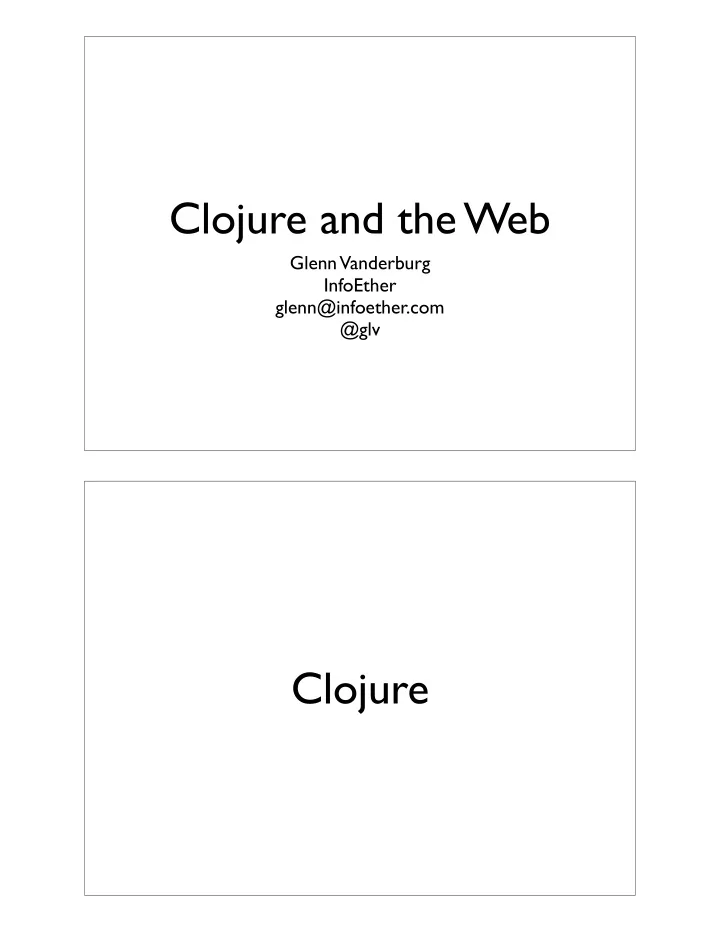

Clojure and the Web Glenn Vanderburg InfoEther glenn@infoether.com @glv Clojure
Clojure • Modern dialect of Lisp • Runs on the JVM • Gives priority to performance and concurrency Surface • Extra literals (maps, vectors, sets, regexps) • Metadata • Renamed / simplified traditional functions • Sequences • Destructuring
Underneath • Concurrent data structures • STM • Agents • Atoms and dynamic vars • Lazy evaluation Java Integration • Java methods appear to be single-dispatch generic functions. • I’d rather write Java in Clojure than in Java. (.size props) (.put props "key" value) (let [conn (doto (HttpUrlConnection. url) (.setRequestMethod "POST") (.setDoOutput true) (.setInstanceFollowRedirects true))] ; ... )
Philosophy • Pragmatic • Encourages a functional style • Allows for compromise Clojure Web Development • Cascade • Ring • Clothesline • Twister • Compojure • Webjure • Conjure
HTML Generation • clj-html • Enlive • Fleet • Hiccup Persistence, etc. • Plenty of options • Obligatory “plus Java libraries” plug
Response Request Architecture Ring H a n d l e r H a n d l e r H a n d l e r H a n d l e r H a n d l e r A p p
Response Response Request Request Architecture Architecture H a n d l e r H a n d l e r I’m a handler, too! H a n d l e r H a n d l e r H a n d l e r H a n d l e r H a n d l e r H a n d l e r H a n d l e r H a n d l e r A p p A p p
Request { :server-port 80 :server-name "example.com" :remote-addr "127.0.0.1" :uri "/help" :query-string "search=ring" :scheme "http" :request-method :get :headers {"accepts" "..."} :body nil ; an InputStream :content-type nil :content-length nil :character-encoding nil } Response { :status 200 :body "hi" ; String, seq, File, or InputStream :headers {"content-type" "..."} }
Apps (defn app [request] { :status 200 :headers {"Content-Type" "text/html"} :body "<h1>OMG HI!</h1>" }) Apps (defn hello [request] (if (= "/hello" (:uri request)) { :status 200 :headers {"Content-Type" "text/html"} :body "<h1>OMG HI!</h1>" } (-> (response "<h1>NOT FOUND</h1>") (content-type "text/html") (status 404))))
Apps (defn hello [request] (if (= "/hello" (request :uri)) { :status 200 :headers {"Content-Type" "text/html"} :body "<h1>OMG HI!</h1>" } (-> (response "<h1>NOT FOUND</h1>") (content-type "text/html") (status 404)))) Middleware Handlers (defn auth-handler [request] (if (authorized? request) (handler request) (-> (response "Access Denied") (status 403))))
Middleware (defn wrap-auth [handler] (fn [request] (if (authorized? request) (handler request) (-> (response "Access Denied") (status 403))))) The Gauntlet (defn handler [request] (-> (response "<h1>OMG HI!</h1>") (content-type "text/html") (status 200))) (def app (-> handler wrap-auth (wrap-log :body) wrap-params))
The Request (Again) { :server-port 80 :server-name "example.com" :remote-addr "127.0.0.1" :uri "/help" :query-string "search=ring" :scheme "http" :request-method :get :headers {"accepts" "..."} :body nil ; an InputStream :content-type nil :content-length nil :character-encoding nil } Params Middleware • Parses query string, body parameters • Adds three keys to the request { :query-params {"search" "ring"} :form-params {} :params {"search" "ring"} }
Standard Middleware • file • params • static • keyword-params • content-type • multipart-params • file-info • nested params • cookies • lint • session • reload • flash • stacktrace 3rd-Party Middleware • partial-content • gzip • permacookie • json-params • session-expiry • etag • session stores: • hoptoad mongodb, redis, riak • upload-progress • basic-auth
Adapters • Apache • Jetty • Plenty of others available ! … Routing • For simple apps, build a routing table with regexps and handlers. • Add-on libraries provide routing configuration macros.
Processing Requests (defn login-post [request] (let [user (validate-user (:userid request) (:password request))] (if user (render-template "login_successful" request user) (render-template "login_failed" request)))) Processing Requests (defn login-post [request] (let [user (validate-user (:userid request) (:password request))] (if-not user (error :unauthorized) (render-template "login_successful" request user))))
Templating Templating: clj-html
(defn login-box [] (if (is-logged-in) (do [:span {:class "login-text"} (get-user) " - " [:a {:href (get-logout-url "/")} "sign out"]]) [:span {:class "login-text"} [:a {:href (get-login-url "/")} "sign in"]])) (defn render "The base layout for all pages" [body] (html (doctype :html4) [:head (include-css "/stylesheets/style.css")] [:body [:div {:class "container"} [:div {:id "login"} (login-box)] [:div {:id "content"} body]]]))
(defn index [request] (render "Howdy!")) Templating: Enlive
<!-- file index.html --> <!DOCTYPE html PUBLIC "-//W3C//DTD HTML 4.01//EN" "http://www.w3.org/TR/html4/strict.dtd"> <html> <head> <link rel="stylesheet" type="text/css" href="/stylesheets/style.css"/> </head> <body> <div class="container"> <div id="content">body text</div> </div> </body> </html> (deftemplate index "templates/index.html" [body-text] [:div.container] (prepend (login-box)) [:div#content] (content body-text))
<!-- file snippets.html --> <div id="login"> <span class="login-text">Login form or logout link</span> </div> (defsnippet login-box "templates/snippets.html" [:#login] [] [:div#login :span.login-text] (content (html-snippet (if (is-logged-in) (str (get-user) " - " (link-to "sign out" (get-logout-url "/"))) (link-to "sign in" (get-login-url "/"))))))
(index "Howdy!") Templating: Fleet
<!-- file templates/index.html.fleet --> <!DOCTYPE html PUBLIC "-//W3C//DTD HTML 4.01//EN" "http://www.w3.org/TR/html4/strict.dtd"> <html> <head> <link type="text/css" href="/stylesheets/style.css" rel="stylesheet"/> </head> <body> <div class="container"> <(login-box)> <div id="content"> <(str data)> </div> </div> </body> </html> <!-- file templates/login-box.html.fleet --> <div id="login"> <span class="login-text"> <(if (is-logged-in) "> <(get-user)> - <(link-to "sign out" (get-logout-url "/"))> <" (link-to "sign in" (get-login-url "/")))> </span> </div>
(fleet-ns view "templates") (view/index "Howdy!")
Recommend
More recommend